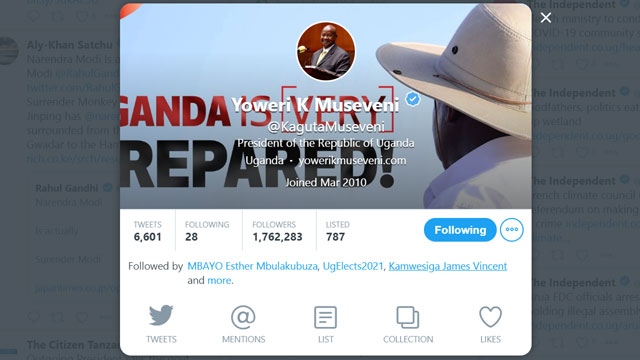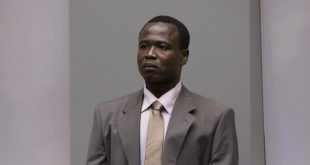
Kampala, Uganda | THE INDEPENDENT | With 1.7 million followers on Twitter and 700,000 on Facebook, President Yoweri Museveni often uses his social media accounts to make pronouncements on key government decisions, disseminate information on his activities and key policy issues. Yet, the account is considered private according to a recent High Court ruling.
According to the court, the president legally blocked a Ugandan Harvard University student Hillary Innocent Taylor Seguya @HillaryTaylorVI, from following him on twitter because Museveni’s Twitter account @KagutaMuseveni is personal and he enjoys a right on who to block or unblock, as well as who to follow or unfollow.
The decision by Justice Andrew Bashaija followed a suit in which Seguya argued that by blocking him on Twitter, the president had infringed on his right of access to information and freedom of speech because he was unable to see or respond to tweets on the president’s official handle.
Seguya has been unable to follow, tag, like or retweet any content from the presidents handle, as well as personal handles of other government officials, among them Ofwono Opondo (@OfwonoOpondo), the government spokesperson and Asan Kasingye (@AKasingye), the Police Forces Chief Political Commissar since July 2019.
But Justice Bashaija advised Seguya to instead follow @PoliceUg to get information from the Uganda Police Force, @UgandaMediaCent for the Media Centre which is headed by Ofwono Opondo and @StateHouseUg for information from the State House which could also cover the Presidency.
Media scholars and experts, however, say that the privacy of an individual often overlaps and is interrelated with public life, and cannot, therefore, be concluded that a person’s social media account, even with his name, is private especially if they are holding public office.
William Tayebwa, the head of the Makerere University Department of Journalism and Communication says that if one is a Government official, like the Speaker of Parliament, Minister or President, they should have an official or public account for official business and a personal account for private issues. He says the problem is that by default, private accounts of public figures become the same.
Tayebwa argues that any public servant at that level of leadership ceases to own what ordinary people call private accounts and adds that unless the account is encrypted and the information is not available to the general public then it can be considered private.
Juliet Nanfuka, a Digital Media Expert with Collaboration on International ICT Policy for East and Southern Africa (CIPESA-Uganda) says that if someone is using their account, the onus is on the person to block their followers, especially if they are being attacked online. However, she adds, this also depends on the nature of the content being raised.
She says that the cause of the action sometimes, is a matter that should be questioned, whether it was an attack on the person, or if simply the person was avoiding public scrutiny. In President Museveni’s case, Nanfuka says the challenge comes with the access to information law which states that every citizen should be able to access information.
Before he was blocked, Seguya, a student of International Relations had openly told Ghanaian President Nana Akufo-Addo that he had wanted to exchange him for Uganda’s President Yoweri Museveni. “I wish we could exchange you for our Ugandan president. He’s a dictator – Yoweri Museveni – he has been in power for 33 years and we are telling him enough is enough,” Seguya said.
 The Independent Uganda: You get the Truth we Pay the Price
The Independent Uganda: You get the Truth we Pay the Price




Barlow https://17ok.com/